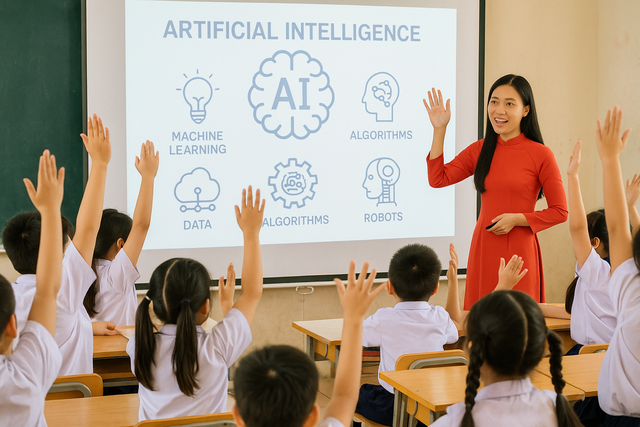
After a period of concern and prohibition, the trend of bringing AI into general education is blooming globally.
ILLUSTRATION: CHATGPT
Teaching AI from kindergarten
The United Arab Emirates (UAE) will introduce AI into the curriculum in public schools as an official subject from the 2025-2026 school year. This is the information shared by UAE Prime Minister Sheikh Mohammed bin Rashid Al Maktoum on social network X on May 4 and this policy will be applied at all levels, from kindergarten to grade 12, "to prepare the future generation to enter a new world ".
"Our goal is to help them gain a deep understanding of AI from a technical perspective, foster an awareness of the ethics associated with this new technology, and enhance their understanding of data, algorithms, applications, risks, and the connection between AI and society and life. We have a responsibility to prepare our children for an era unlike ours," he shared.
According to a statement from the UAE Ministry of Education, the AI curriculum has seven contents, including fundamental concepts; data, algorithms; software use; ethical awareness; practical applications; innovation and project design; policy and community engagement. The curriculum will be tailored for each age group and divided into three different cycles, Emirates News Agency reported.

The Prime Minister of the United Arab Emirates announced that AI will be taught to public school students from kindergarten to grade 12.
PHOTO: SCREENSHOT
With this move, the UAE has become one of the first countries to introduce AI into the curriculum of public kindergartens and primary schools. A few weeks earlier, US President Donald Trump signed an executive order on April 23 to introduce AI into the curriculum from kindergarten to grade 12, creating opportunities for students to participate in AI courses and certification programs.
According to the decree, the US government will establish a White House Working Group on AI Education with the participation of leaders of many relevant ministries and agencies, headed by the Director of the US Office of Science and Technology Policy. This group is responsible for all tasks related to bringing AI into schools, from teacher training, allocating research funds, developing vocational training programs...
Meanwhile, the Beijing Municipal Education Commission (China) announced in March that all primary and secondary schools in the city will teach AI to students for at least 8 hours per school year, starting from the 2025-2026 school year. In AI lessons, Chinese students will not only learn how to use AI chatbots like DeepSeek and related tools, but also learn basic knowledge about AI and ethical issues when using AI.
Beijing authorities added that schools can integrate AI teaching into existing subjects such as information technology or science or can teach it as a separate subject. In addition, China's Ministry of Education in late 2024 selected 184 schools across the country to pilot AI models and curricula, laying the foundation for future replication, Fortune reported.
Actively use AI tools
In addition to teaching AI in the curriculum, many countries have also been applying AI tools to the learning process in the classroom. For example, the government of Estonia in Europe announced that from the beginning of September this year, the country will start implementing the "AI Leap" program - a collaborative project with OpenAI - for 20,000 high school students and 3,000 teachers to support learning and teaching, according to Euronews .
Meanwhile, the Korean Ministry of Education has started to deploy AI digital textbooks for all three levels of students since March 2025 to personalize the learning process. There are currently 76 approved AI digital textbooks, including English, math, and programming. By 2028, all subjects are expected to deploy AI digital textbooks, and schools can choose whether to use them or not, according to the announcement.
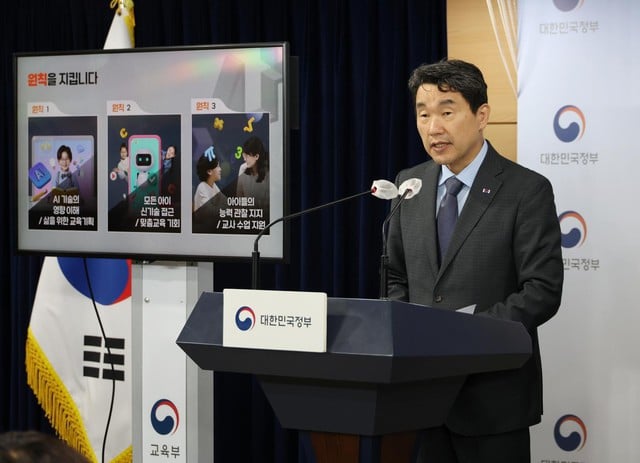
South Korean Ministry of Education representative announced plan to deploy AI e-textbooks in 2023
PHOTO: SOUTH KOREA MINISTRY OF EDUCATION
In the UK, Sky News reported that David Game College, a private school in London, last year launched a “teacherless” classroom – where students use virtual reality headsets combined with computer-based AI platforms to learn instead of listening to teachers. In addition, the UK Department for Education also issued a document on AI in early 2025, which guides teachers and students on the safe, effective and responsible use of AI.
As reported by Thanh Nien , since 2023, some Southeast Asian countries have stepped up their approach and built general education programs with AI and digital technology as the "guiding principles". In Vietnam, the Ministry of Education and Training assessed that Resolution 29 and Resolution 57 create a favorable context for bringing AI into general education. Provinces and cities need to proactively pilot in some specialized, high-quality schools, according to Deputy Minister of Education and Training Pham Ngoc Thuong in March.
Source: https://thanhnien.vn/the-gioi-tang-toc-dua-ai-vao-truong-hoc-co-noi-bat-dau-tu-mau-giao-185250506165731847.htm






![[Photo] Prime Minister Pham Minh Chinh chairs the first meeting of the Central Steering Committee on housing policy and real estate market](https://vphoto.vietnam.vn/thumb/1200x675/vietnam/resource/IMAGE/2025/9/22/c0f42b88c6284975b4bcfcf5b17656e7)







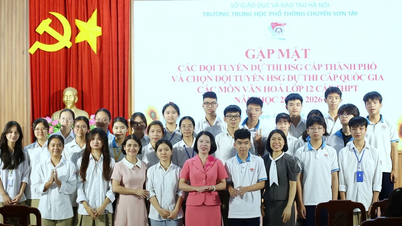

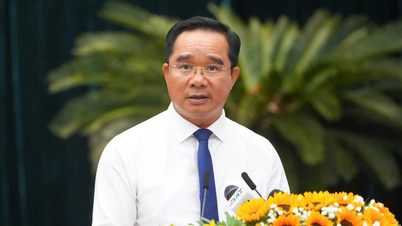




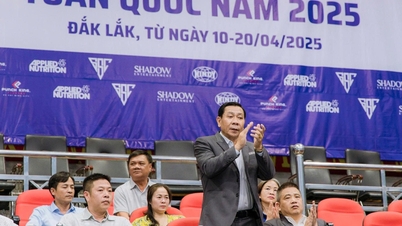





![[Photo] General Secretary To Lam presents the First Class Labor Medal to the Vietnam National Energy and Industry Group](https://vphoto.vietnam.vn/thumb/1200x675/vietnam/resource/IMAGE/2025/9/21/0ad2d50e1c274a55a3736500c5f262e5)



























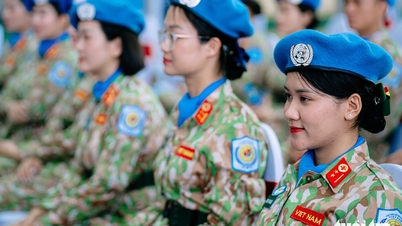




































Comment (0)